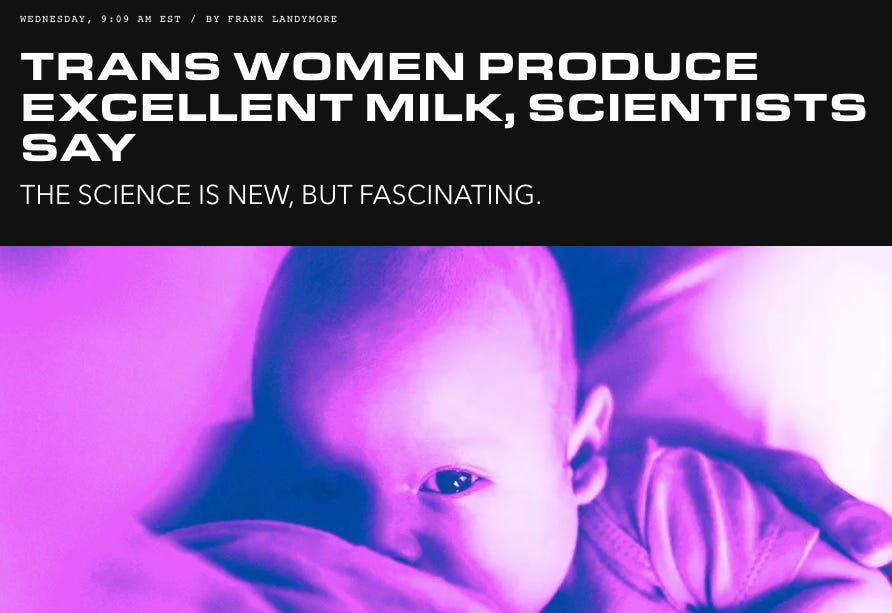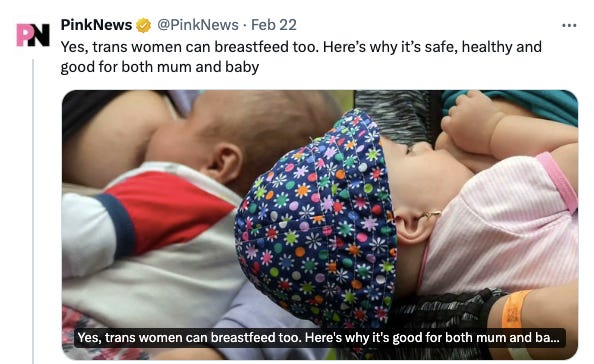For the BBC, sorry seems to be the hardest word
The media are currently putting babies at risk with their inability to apologise
Friday is usually my day for The Word is Woman, but this week there is a bit more to say about the story that has certainly dominated my week, if not yours - that of ‘trans breastfeeding’.
And of course, this story directly relates to our purposes on The Word is Woman - because, at least in part, it’s about the consequences of changing the meanings of words. Terms like ‘human milk’ and calling people ‘women’ when they are male, can sew confusion on an epic scale, and even bamboozle those who are paid to analyse, question and think.
On Tuesday I wrote a post that has since had 20 thousand views and caused a bit of a storm. The post was a response to a BBC News item on Monday night in which the presenter Rajini Vaidyanathan claimed that, according to the NHS, the World Health Organisation (WHO), and numerous studies, ‘transgender women’s milk is just as good for babies as breastmilk’. Vaidyanathan’s guest, a woman completely unqualified in the area of breastfeeding, Kate Luxion, not only supported this claim but built on it, stating that male ‘milk’ was not just equivalent to, but potentially of ‘higher quality’, than women’s.
I investigated the roots of all of these claims, and if you’ve not read the post, here it is in full.
To summarise my findings:
All of the news coverage came from one letter written by an NHS medical director, now no longer in post.
Nowhere has it been stated that this letter represents the position of the NHS itself.
The WHO guidance that the letter refers to concerns the benefits of women breastfeeding over formula milk and is not about induced lactation.
The letter refers to five academic studies that support induced lactation but four out of five of these studies are on females.
The BBC referred to ‘one case found what it called no observable effects in babies fed by induced lactation'. This study was in fact into the effects of a female person taking testosterone whilst breastfeeding.
The one study in the NHS letter that was into male ‘milk’ was a case study of a single male. (more on this in a moment)
This was the same study that Kate Luxion suggested showed male milk was of ‘higher quality’. In fact, that study found the male ‘milk’ to have a higher fat content. This is not an indicator of quality.
But in spite of the huge numbers of people who have been reading and sharing my piece, the misinformation at the heart of the story has continued to be spread globally.
An article in ‘Futurism’, who I hoped might be a niche bunch but who in fact have 1.2 million instagram followers, went with:
with the opening paragraph claiming:
Pink News went with:
also citing the one study into a trans male’s attempts to lactate from the NHS letter in their article.
Let’s talk about that study.
With the way the whole world appears to be leaning on it to support the idea that men can breastfeed, you would think it would be gold standard research, right?
But Emma Hilton, a developmental biologist at the University of Manchester, has pointed out that the study itself was flawed because there was no protocol for sample acquisition. In other words, the man in question brought samples for analysis that nobody had observed he obtained from his own nipples. Hilton points out that in sports doping tests, for example, you actually have to have people watch you pee. But in the man in the study’s case, no such checks were made, and added to which, he was also sharing a home with his female lactating partner.
None of this means that the man in the study did actually cheat with his sample. What it does mean is that it undermines the quality of the study.
The study is also undermined by the fact that the person who conducted it, Dr Amy Weimer MD, is a doctor who specialises in paediatric transgender medicine, working for the UCLA Gender Health Programme which provides everything from hormone therapy to surgery to trans identifying patients ‘of all ages’.
As averse as I am to conspiracy theories, it’s been tempting at times to wonder if this misinformation is intentional. Why would the state broadcaster effectively rubber stamp this story, allowing false claims that males can breastfeed to be spread far and wide? Why would they not correct their error? Why would the NHS trust not come forward and offer clarification? All they have said is that they ‘stand by the facts of the letter’ - a very slippery response really because ‘the facts of the letter’ are clearly very confusing to people, mainly because of the insistence on using terms like ‘human milk’ and thus refusing to distinguish between male ‘milk’ and mother’s milk.
I think there is probably an element of ‘bad actors’ in the story, but that, in the main, the confusion is simply down to a chain of miscommunication, aided and abetted by a few people in the mix who are pro the idea of male people breastfeeding - the doctor at Sussex, perhaps, or the researcher who chose to dial up an unqualified LGBTQ specialist academic for an interview on the BBC about the science of breastfeeding. Even I was part of that miscommunication chain - when I was contacted by the Telegraph on Friday I should have delved more into the studies linked to in the letter then, but to be honest, I’m so used to these insane claims being made that I just assumed, oh, here is another one. (Plus I trusted that the journalist would have looked into it properly - it wasn’t my job to examine the story forensically, it was his).
Meanwhile over on twitter the trans activists are having a field day, using the story to claim that men can be women and do everything that women do (a nice reversal of the feminist struggle?!). Essentially their position is, “Why does a man breastfeeding bother you so much?” (although of course they would call that person a woman). In thinking about the answer, I was reminded of the time, a long time ago when The Mule was hosted on blogger, and I got so many perverted comments on the breastfeeding posts I wrote that I eventually decided to take down all the pictures of myself and others nursing their babies from the blog. Naively, it hadn’t occurred to me just how popular a fetish breastfeeding was, and how photos of what seemed to me and the other mothers sharing them the most beautiful and pure act of love, meant something very different to the men in my comments section. They definitely didn’t seem bothered, either, that the photos all included babies and toddlers. Which is an extremely unpleasant thing to contemplate, but it has to be part of the conversation about this I think.
It is disheartening that no media outlet including the BBC has seen fit to correct this story, which is truly ‘fake news’. I have emailed the BBC to complain and if you haven’t already, you can do so here quite easily and quickly. It’s also disappointing that, as yet, no news outlet has covered the story that the BBC and others have put out false information and made no apology (although I do have a possible lead on this, watch this space). You would think that this would be a good and important story to cover in itself - the 20 thousand of you who read my original post seem to think so? And it’s not just about ‘fake news’. Ultimately, this is a child protection issue. As long as the completely false information that ‘men can breastfeed and it’s just as good as breastmilk’ is allowed to stay out in the world and solidify, then babies are being put a risk. And even if that is only one baby, it is one baby too many.
This substack is supported by you - the reader. Please take out a paid subscription if you can, and join my community of like minded thinkers here at The Mule. We even have a monthly writing group - the next one is next week! If you can’t afford a paid sub, then do subscribe for free anyway, and we can keep in touch. Thanks! x
To complain, please visit this link: https://www.bbc.co.uk/contact/complaints/make-a-complaint/#/Complaint
If you have extra time, please also contact BBC Radio 4 More or Less and ask them to investigate the claims made in the news coverage of this story. moreorless@bbc.co.uk










Good you are continuing with this, Milli.
In threads on the topic on Twitter I have been told a few times that of course there’s no such thing as a fetish for breastfeeding, that it’s our filthy minds that are sexualising it all.
This is despite the existence of ‘lactation porn’ of various types. I helped admin a breastfeeding helpline for many years and we had to develop a protocol to deal with creepy men who called it (sometimes claiming to be women, sometimes claiming to be speaking on behalf of their partners, sometimes just wanting to talk about breasts, bras & milk). We developed a quick line of questioning that speedily ascertained whether these calls were genuine - there are 2 questions to ask which immediately reveals when there’s no baby (I won’t repeat them here as who knows who might be reading).
The other line I have been confronted with three times now is ‘well, plenty of cis woman breastfeed for fetishistic reasons too, why don’t you criticise them?’
Male breastfeeding is a potentially serious safeguarding issue. It’s horrendous that anyone in the health services should actually support the idea.
I'd like to think something is in the water or an alien brain wave disruptor has been aimed at the Earth, but, alas, I fear people are just this insane naturally.
Transwomen (males) produce naturally good milk.
No!
Males are not meant to produce milk, and the substances these males are given to cause them to lactate can't be healthy for the infant.
I remember reading something from La Leche League back in 2014 scolding women who had concerns about the increasing use of terms like "chestfeeding." Unfortunately I didn't save this sharticle, but it did call the dissenters TERFs and the less common FART (feminism-appropriating radical transphobes.)
I was still in my "be kind" phase at this point, but this bothered me.
Only women breastfeed.
Feminism is only for women.
It's strange that it took me three more years to see how truly awful queer theory and identity politics is. I blame the alien brain wave ray.